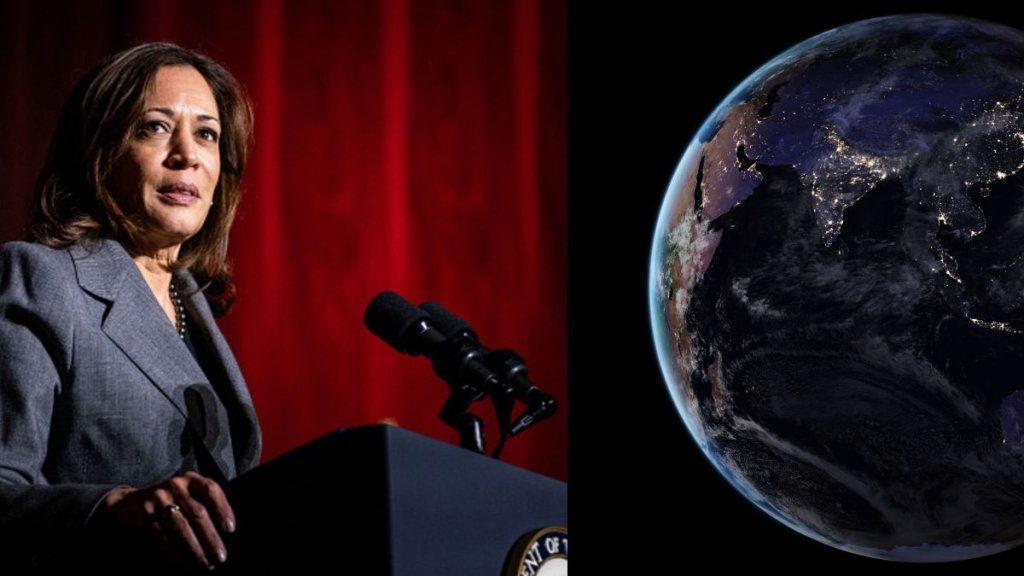US Vice-President Kamala Harris will speak with big space companies today (Feb. 23) about addressing climate change through space technologies, along with other administration priorities.
In the coming months, SpaceX, Amazon and other private, non-profit, or educational organizations making up the National Space Council’s (NSpC) users’ advisory group (opens in new tab) will discuss priorities like climate change and economic opportunity for jobs to support the fight against global warming, a White House official told Space.com exclusively. (Harris is chair of the NSpC as well, and will talk with representatives of the users’ advisory group after their debut meeting today.)
Not all members of the users’ advisory group were at the first meeting Thursday (Feb. 23), however. SpaceX was not in attendance. A representative from Amazon was, but left before meeting with the Vice-President. Member companies that were there throughout included Boeing, Blue Origin and Lockheed Martin, while representatives from other sectors were in attendance, such as a teacher, the White House background briefing said.
While the discussions are early-stage and the results will come after the users’ advisory group has its say, Chirag Parikh, the NSpC’s executive secretary, told Space.com that one large goal would be to make sense of the amount of data collected by satellites and other Earth observation systems to address issues.
“We have this enormity of data that’s collected in space. What’s the best way to be able to coordinate that information?” asked Parikh, who is also deputy assistant to President Joe Biden.
“What’s the best way to be able to make that information accessible—not just to the climate researchers, which are incredibly important people around the world—but also state and local governments, to communities, to urban planners. so they can actually make that information accessible and usable,” he added.
The discussions are part of the Biden administration’s larger push to address climate change and other ways in which space technology can benefit Earth, according to background information provided by the White House. The meeting also aims to build on past discussions by the NSpC, which has also focused on how to bring the benefits of space infrastructure to more people, the White House says.
More generally, the users’ advisory group aims to recommend actions to the Harris-led NSpC concerning space policy and strategy and to align corporate activities with government policies. Climate change, however, is among the Biden administration’s priorities.
The administration has a goal of reaching “net zero” in United States carbon emissions no later than 2050, and reducing greenhouse gas emissions by as much as 52% by 2030. Harris, as NSpC chair, has been discussing international agreements to address climate change with leaders around the world.
Related: Climate change: Causes and effects
(opens in new tab)
Twinned with this climate push is a desire by the Biden administration to create new kinds of jobs and opportunities in the space sector, opening up participation to a larger segment of the US population. Amazon and SpaceX are among the signatories to a September 2022 agreement among several companies, announced by Harris and her office, to provide training for community college students in space tech.
At the time, the Vice-President’s office said their goal is to increase diversity and require less training to participate in the space sector, which typically attracts graduates from the Ivy League or highly expensive technical or engineering schools.
The NSpC users’ advisory group has six subcommittees, including one focused on science, technology, engineering and math (STEM) and potential workforce opportunities, the White House background briefing told Space.com.
The Space.com briefing indicated one goal of the NSpC is to partner closely with industry to grow the workforce in targeted areas like electricians and welding, which have high demand, in concert with the US Department of Labor’s national apprenticeship accelerator (opens in new tab) program that aims to start people in the workforce swiftly.
Related: VP Kamala Harris calls to diversify US space workforce
(opens in new tab)
To be sure, space launches are a contributor to climate change, but private industry is also looking for ways to offset that through offering tech like precision mapping (which allows vehicles like planes or tractors to map out better routes, to reduce emissions) or purchasing renewable energy.
For example, Amazon purchased 6.5 gigawatts of renewable electricity production capacity as of 2020 (opens in new tab), or the equivalent amount of energy to supply 1.7 million US households.
The White House briefing acknowledged that the space economy is fast-growing and also encompasses numerous sectors, including civil, defense, intelligence and commercial, some of which is backed by lucrative venture investment.
The US government is also seeking to bring in more voices among its departments, with roughly 14 departments and agencies collaborating with senior officials inside the White House on space issues, the briefing indicated to Space.com.
An example is the Department of Commerce, which works with other government entities on matters ranging from space traffic management (there are more satellites in space than ever, leading to worries about space debris or signal interference) to how space satellites can monitor the effects of climate and weather on infrastructure.
The goal of the users’ advisory group, however, is to provide more perspectives outside of government, to help inform the Biden administration’s approach to space issues, the White House background briefing added.
This story was updated at 6:33 a.m. EST Feb. 24 to reflect new information about the companies in attendance at the users’ advisory group meeting.
Elizabeth Howell is the co-author of “Why Am I Taller (opens in new tab)?” (ECW Press, 2022; with Canadian astronaut Dave Williams), a book about space medicine. Follow her on Twitter @howellspace (opens in new tab). Follow us on Twitter @Spacedotcom (opens in new tab) or Facebook (opens in new tab).

